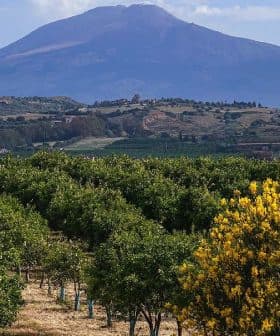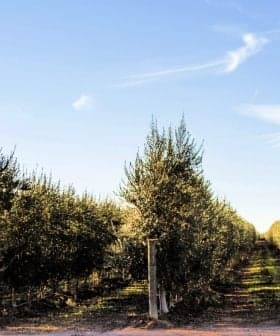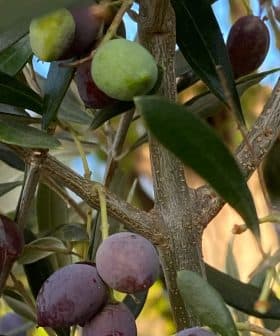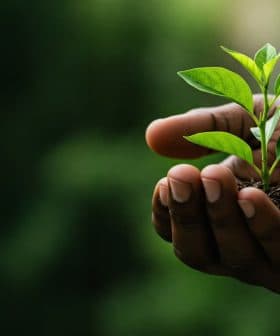Italian Olive Growers Suffer Through Long Summer of Drought, Wildfires
Coldiretti estimates that wildfires cost the Italian agriculture sector at least €1 billion in damage. Olive growers blame climate change for longer, hotter and drier summers.
Lower temperatures and rainfall in Italy have helped reduce wildfires, but farmers have suffered significant losses. The fires, combined with heatwaves and drought, have led to decreased olive yields and fruit drops, prompting calls for improved water management and infrastructure to combat the effects of climate change.
Lower temperatures coupled with much-needed rainfall last week have finally reduced the number of wildfires in Italy after a hot and dry summer saw numerous blazes engulf the country.
From north to south, municipalities, firefighters, volunteers, farmers and olive growers have been working to reduce the damage done to crops and infrastructure due to the wildfires. Several people have lost their lives to the wildfires.
Life depends on water, and we cannot expect our olive trees to keep up their once abundant production.
Italy’s leading farmers’ association, Coldiretti, estimated that Italian farmers have suffered at least €1 billion in losses due to the fires.
The association also asked for immediate compensation after “tens of thousands of hectares of woods and Mediterranean maquis burned to ashes, with olive orchards and trees carbonized, animals dead and pastures destroyed.”
See Also:Algerian Farmers in State of Shock After Week of Deadly FiresRepeated heatwaves in the country have also compounded the effects of the drought on yields and harvests.
“For our olives, the problems are even greater than just high temperatures,” Angelo Del Cima, an agricultural expert and farmer in the central Italian province of Viterbo, told Olive Oil Times.
“Olive flowering in the spring is now more and more often followed by some very quick temperature rises,” he added. “While the olive tree is strong and resilient and can withstand such events, its production capacity is heavily affected by such abrupt weather changes.”
Similar comments come from the olive growers in the Lake Iseo region in Lombardy, where the weather changes have impacted olive flowering and ripening to the point that many farmers report fruit drops.
Local growers also blame the ubiquitous presence of the Asian marmorated stink bug, whose spread is increasingly connected to reduced olive yields.
According to the producers’ association, Italia Olivicola, water stress exerts its effects not only on the ripening of the fruit for the 2021 harvest but may also negatively affect the following season.
Del Cima is among those farmers who grow olive trees alongside other crops, such as legumes.
“I remember very well when the land was wet for 25 days in March,” he said. “Now, in the last few years, agricultural land in March seems dry as it used to become in August.”
On the warmest days of the year, heatwaves in southern regions such as Sicily have provoked unheard-of temperatures, up to 48.8 ºC, a record-high temperature in Europe.
See Also:Thousands of Hectares of Olive Trees Burned to Ashes Across Southern TurkeyWhile experts agree that such high temperatures increase the risk of wildfires, Coldiretti warned that not all blazes have a natural origin, even more so when they happen in the woods.
The association believes that many fires are sparked intentionally to devalue land and fuel speculation on the future of the property.
“If we consider that six out of 10 wildfires are of criminal origin, Coldiretti believes that… the period during which the affected territories cannot have their registered use changed must be increased from 15 to 20 years,” the association said.
Coldiretti asked for the current law against such speculations to include all pasture and farming land.
Enhancing measures to prevent wildfires has also become a top priority for local administrations.
In Tuscany, the regional government has banned burning brushwood and vegetable remains from farming activities until September 19, and a few other regions are expected to follow suit.
According to Tuscan Agrifood Secretary Stefania Saccardi “an incorrect, reckless or superficial behavior could result in severe environmental damage both to forests and the safety of citizens and to the economy of all those agricultural and tourist accommodation activities that live in the agricultural and forestry environment. We, therefore, call on farmers and private individuals to behave prudently.”
According to Coldiretti, the time has come for working on “economic and social conditions to counteract the abandonment of the countryside and give value to those activities of surveillance, maintenance and managing of the land carried out by farmers.”
“We should also focus on good farming practices to prevent blazes,” added Del Cima, referring to the many fires that have been fueled by cut grass left by farmers in olive groves and other agricultural lands.
“Nowadays, many cut the grass on their fields and then leave it there for several good reasons, such as maintaining humidity on the soil or reducing erosion,” he added. “Maybe it is time that farmers alternate the cut grass cover, leaving it one year over a portion of their territory and the year after leaving it on a different portion.”
See Also:Heatwave, Deadly Fires Threaten the Approaching Olive Harvest in GreeceAccording to Marco di Fonzo, head of the special Carabinieri division dedicated to combating the fires, his unit has identified 40 different causes for these blazes just this year.
“They go from the burning of vegetable remains to brambles that are set on fire, down to the conscious act of arsonists, although they are only a few, and to vandalism,” he said. “It even happened that a few youngsters started a fire to witness the following actions of the firefighters.”
Di Fonzo added that the number of fires in Italy “grew substantially, not in an extreme manner. However, when it comes to the number and dimension of the blazes, the most affected regions are Sicily and Sardinia. In this period of the year, Puglia and Calabria are also quite at risk.”
And while compensation for the damage will soon reach farmers and agribusinesses, rare rainfalls and a few powerful thunderstorms did not end the drought emergency, with dry land remaining an easy trigger for wildfires.
“That is the number one concern. Life depends on water, and we cannot expect our olive trees to keep up their once abundant production,” del Cima said. “Today, drought is much worse than it used to be 20 or 30 years ago.”
“In our area, rainfall scarcity is the first line of evidence of the effects of climate change,” he added. “While olive oil quality stays strong, olive yields are dropping by the year.”
Both Coldiretti and the Confederation of Italian Farmers (CIA) stress the importance of more sustainable water management policies and new infrastructure to collect water and rainfall throughout the country.
According to Danilo Misirocchi, president of the Romagna branch of the CIA, more can be done to “activate new [water and rainfall] collecting areas” after two decades, in which many efforts have made it clear that improved infrastructure is needed in the region.
“Hills are the part [of the Emilia-Romagna region] which are suffering most water scarcity,” he said. “No water means no production.”
Coldiretti warned that a large portion of the summer crops is also at risk in the northern Piedmont region.
“We have moved from severe weather with disastrous downpours and tornadoes to periods of drought, so much so that 40 percent of the total summer production is now at risk,” said Roberto Moncalvo, member of the Cuneo branch of Coldiretti. “In the first six months of the year in the northwestern province of Cuneo, an average of 320 millimeters of water fell compared to the 650 usually recorded.”
“One thing I notice is that people who live in the cities do not seem to grasp the severity of climate change,” del Cima concluded. “We need to get our acts together if we want to limit the damage that has already been caused.”









